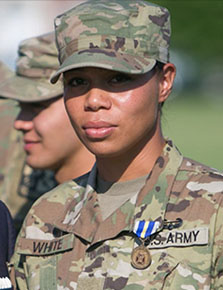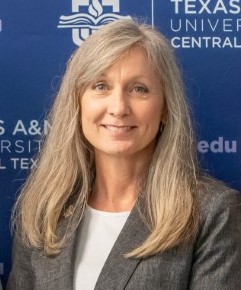
Going to college and performing research can be difficult and time-consuming endeavors. In March 2020, these activities were made even more difficult for many in higher education due to lab closures and changes in course instruction. Despite the uncertainty and new obstacles the COVID-19 pandemic brought, 2nd Lt. Fesui White, psychology alumna and newly commissioned officer in the U.S. Army, excelled.
Her drive and motivation to succeed led to the completion of a research project for her online Research Methods course that became much more than just a class assignment. The research she completed has the potential to help faculty improve online instruction as the reliance on technology increases as many courses shift modalities due to the pandemic. White’s ultimate hope is for the research to be used to shape recommendations for strengthening student and faculty interactions both at A&M-Central Texas and beyond.
Dr. Andria Schwegler, Associate Professor of Psychology and principal investigator for the research, was by her side every step of the way. Dr. Schwegler was an important source of mentoring and counsel to White not only for the project, but in the course as well.
White and Schwegler remained in constant contact throughout the semester and collaborated effectively through difficulties. Of course, there were some adjustments that had to be made due to the pandemic, but they persevered.
“I had a job, and I was doing ROTC, and we have drills, and my baby sometimes just doesn’t want to go to daycare. So it’s always mommy and daughter day,” said White.
Schwegler added, “We’re both parents, with childcare responsibilities and school-related obligations. There are many things going on in our lives right now… but it didn’t hamper our work. We just stayed focused and adapted to whatever was happening at the time.”
“All faculty members and students are flexing right now … but we can make schedules that are workable and still produce a quality product.”
White and Schwegler are extremely proud of what they accomplished. “We leveraged the context of a fully online course to create a timely and meaningful learning opportunity for Ms. White and me,” said Schwegler.

Dr. Andria Schwegler Associate Professor of Psychology
Planning the research
At the start of the semester, White had many research ideas. While most of them would make for good research, there wouldn’t be enough time in the semester to complete the project and get Institutional Review Board (IRB) approval.
“I threw out ideas not fully knowing the IRB procedures, not knowing what’s exempted and what’s not within the guidelines of this course … So Dr. Schwegler steered me into the right direction,” said White.
Schwegler and White met online numerous times to narrow down her ideas. If one couldn’t be completed within the timeline of the course, it was scratched off the list. Ultimately, White decided on a topic that not only met course requirements, but was of interest to her: interactions between students and professors and how they are related to students’ academic success.
She and Schwegler decided to measure the quality of student-faculty relationships and academic performance. However, these plans were going to change as COVID-19 swept across the globe.
Adapting to the pandemic and collecting data
Schwegler and White had been keeping an eye on the news, so just before submitting the research for IRB review, they were able to adapt the study to assess the impact of the switch from face-to-face to remote instruction on students in the context of their existing relationships with faculty.
“Ms. White had settled on the idea of examining the relationship between faculty members and students. But, as we saw the world changing and the pandemic spreading, we reacted to that,” said Schwegler. “We were able to stay on track with the project but adapt it as the semester drew on, adding measurement of transactional distance before and after the pivot to remote instruction.”
Transactional distance is defined as “barriers to student’s engagement with learning in the online environment.” The larger the transactional distance, the less communication there is between student and instructor which could negatively impact the student’s academic success.
“In the online environment faculty have to create the context for interactions to occur so that students don’t feel remote and don’t perceive a psychological distance despite the physical distance between us… We have to create opportunities for interaction to occur so those critical academic connections can happen,” said Schwegler.
Because the Research Methods class was already an online course, the adjustment for students to fully remote instruction wasn’t difficult though students in the class still faced some challenges. Because White invested herself in the course and stayed prepared, the adjustment was less difficult for her.
“Ms. White stayed on top of the assignments and actively sought the assistance she needed to get the task done,” noted Schwegler.
In less than two weeks, White’s research proposal received approval from the university’s IRB. She was excited to promote her survey on campus and start data collection the week right after Spring Break.
"Sometimes a class research project takes on a life of its own when the student shows investment in it and a willingness to continue."
But, when COVID-19 hit Bell County, the campus canceled classes for a week as it prepared to shift to remote instruction.
With the shift, White couldn’t promote her survey on campus, which she had planned to do by handing out fliers to fellow students. Instead, she shared the fliers virtually with her personal contacts and classmates in the Counseling and Psychology Department. Soon her study gained the attention of faculty, and eventually caught the eye of Dr. Brandon Griggs, Dean of Student Affairs, who offered to help distribute the survey to the campus community.
“He saw it, and he invested in our project and wanted to help out. He was able to email our flier and our Qualtrics survey link to basically 100% of the students on campus,” said White.
Schwegler noted that it was White’s drive that contributed to the success of the data collection.
“Sometimes a class research project takes on a life of its own when the student shows investment in it and a willingness to continue. In this example, we went from collecting data just within the Counseling and Psychology Department, to collecting data across the entire institution because it is a topic that was very timely given the pandemic and the shift to fully online instruction,” said Schwegler.
Since the flier was sent out to all students, White and Schwegler were able to collect a broader sample of students. They focused on students enrolled in 16-week courses because the majority of them had spent eight weeks before Spring Break in face-to-face or blended classes, and then eight weeks online after the shift to remote learning.
“The survey was retrospective … We had students recall the relationship with their faculty member from the beginning of the semester, and then we asked them about communication before the switch to remote instruction and after,” said Schwegler.
Because of the switch in the modality of instruction, they were able to measure transactional distance in face-to-face, blended, and online classes then determine if there was an increase in perceptions of transactional distance after the switch. An increase in this case meant more barriers for students regarding the interaction with their professors.
Interpreting the Results
“When the pandemic hit, it was like ‘oh goodness.’ No one knew what to do besides switching to 100% online. With this type of research, it kind of gives an initial start, like a kick-start on what to expect and what to have planned and in place for next time."
The main conclusion from the research is that the perception of transactional distance did increase for all groups, but it was slight, and it wasn’t different across course modality.
“The sample of students in face-to-face classes didn’t have a harder time than students in online classes though perceptions of transactional distance did increase,” said Schwegler.
She also believes there are actions that can be taken to lower the perception of transactional distance experienced by students.
“I think the take home message from the research is that if faculty aren’t attentive to the differences in the means to communicate when teaching online, then it may pose a problem for students … We can overcome some of these obstacles if we make those connections with students part of our ongoing course structure and plans. A positive finding from the research is that for faculty and students here, students reported having very good relationships with their faculty. Keeping these relationships strong by creating opportunities for academic interactions online is important for students’ continued success,” said Schwegler.
For White, this type of research is important because it can lead to better preparedness in the future.
“When the pandemic hit, it was like ‘oh goodness.’ No one knew what to do besides switching to 100% online. With this type of research, it kind of gives an initial start, like a kick-start on what to expect and what to have planned and in place for next time,” said White.
Presenting the research and hopes for the future
As the semester came to a close, White submitted her final report that included her results and prepared a presentation to show her classmates. Around the same time a “call for abstracts” caught Schwegler’s attention.
“A leading online learning journal had a call for abstracts for ‘lessons learned about online learning due to the COVID 19 pandemic’, and I thought this might be a great fit, so we submitted an abstract for review” said Schwegler.
Even if their work is not accepted for publication, Schwegler hopes White will have the opportunity to present her research in the near future, including at A&M-Central Texas’ Scholars Day and at a regional conference.
“I think this is something that would capture interest,” said Schwegler. “Even if it’s not a journal publication, we will continue to collaborate to share this research with others in the hopes it can positively impact student-faculty relationships.”
Looking back at the course
Reflecting on her time in the Research Methods course, White is proud of her accomplishments. Not only did she complete an IRB approved research project on a topic that was meaningful to her, but the project became much more than just a course assignment. In addition to making plans to share her research with others, the experience has led her to consider graduate school.
“I think this course alone kind of challenged me and actually put me in a position where I thought, ‘I know I can do this.’ It takes a lot of effort, and a lot of tears and a lot of late nights,” said White, “but it benefited me most in thinking, ‘You know what? I’m going to get my graduate degree.’”
White is especially appreciative of the role the university and faculty played in her success.
“I would like to thank the faculty for their endless support and guidance, and A&M-Central Texas for outstanding procedures and turn-around timeliness,” said White, “last but not least, Dr. Schwegler for always being available and for her professionalism, realistic expectations and guiding me throughout the process. She was my number one supporter!”

